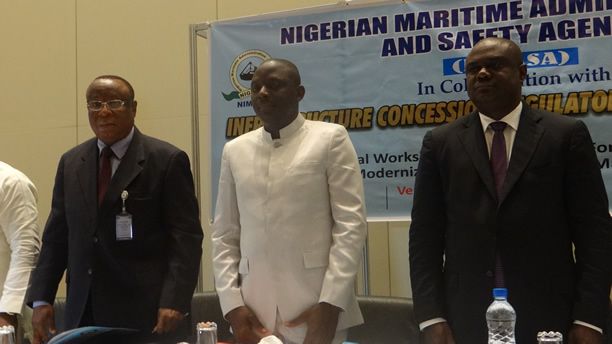The Director General of the Nigerian Maritime Administration and Safety Agency (NIMASA), Mr. Ziakede Patrick Akpobolokemi has described the problems at the nation’s maritime sector as one that requires emergency solutions.
Akpobolokemi who was speaking in an interview with journalists at the just concluded one day National Workshop on PPP Strategy for Infrastructural Development and Modernization in the Nigerian Maritime Sector held in Lagos recently stated that because the problems could be seen as emergency, there was no further need to keep waiting for the government’s intervention to address the myriads of problems in the sector rather than to engage the Public Private Partnership initiative to tackle them.
He observed that the procedures and processes for getting a project executed in the government parlance was quite cumbersome hence the need for the private sector participation, contending that while it could take only a few hours or a few days to get it done, it could take government longer time for the same feat to be achieved.
According to him,” in government, the procedures are quite tasking, the due process requirements, for instance, if you are operating your business, the process that will follow in buying maybe an engine could be few hours or few days but in government, the memo has to be raised, it will pass from one table to the other, eventually, it is going to be approved. You have seen the time that it will take”.
“And some of the problems that we have in the Maritime sector can be termed as emergency and you do not have the time at your disposal to keep waiting in order to achieve what you want to achieve”.
The Director General stated that with the problems bedeviling the Nigerian Maritime sector, one needed to act with the spur of the moment saying that their counterparts in the private sector were better positioned to tackle the problems going by the urgency they required.
He said,” so if these private people comes in, it makes the process faster, more efficient and they are business minded and their success is determined by what effort,time and resources that they put into the process or into the project”.
“If they don’t work hard, they are not going to be paid. It is unlike maybe, if somebody is in government, if they don’t work hard, it may be difficult to say, you go away”.
On his part, the Chairman, Oil and Gas Free Zones Authority, Hon. Chris Asoluka believed that with the Public Private Partnership, the level of activity in the Maritime sector would pick up soon.
Asoluka who said that although people may argue that government would have to sequence its priorities since the absence of sequencing may lead to the government doing everything at the same time which may not engender growth of the industry, however opined that the approach would expose Nigeria to competitive advantage.
“With this, we expect that the level of activity in the maritime sector will explode and perhaps don’t preempt some of the lectures, some of us will like to argue that you have to sequence your priorities because,if there is no sequencing, you begin to do everything at the same time and that may not lead to the growth”.
“But I believe that this approach will expose Nigeria to what we call the competitive advantage. We can develop maritime competitive advantage through serious intercourse in terms of ideas so that people will arise, so that there will be more jobs for Nigerians and Nigerians will be empowered”, Asoluka said.
He however refuted the claims that the government was trying to renege its duties to its citizens by pushing all aspects of the economy in the hands of the private sector saying that the issue of government came out of the need for security and welfare.
He further clarified that aside the security, welfare could be tackled through different approaches adding that PPP may enhance the government reactions to the improvement of welfare for its citizens.

